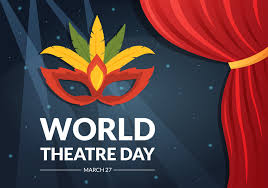March 27 every year is celebrated all over the world as World Theatre Day. It is a day set aside by the United Nations to reflect on the role of theatre in society. The United Nations implements this artistic and cultural agenda under the umbrella of the United Nations Educational, Scientific and Cultural Organization (UNESCO) and the International Theatre Institute (ITI) which are both organs and operational agencies of the world body.
The International Theatre Institute was founded in 1948, after World War Two by theatre experts and UNESCO as a platform to promote the development of the performing arts and advance the cause of peace in the world. Owing to the ugly experiences of people during World War Two, the founders of the International Theatre Institute reasoned that performing artists through their talents, creative works, and professional platforms have a great role to play in healing the world traumatized by the War, making the world a better place by coming to the aid of victims of the armed conflict and ultimately preventing the recurrence of the catastrophe witnessed during the World War.
This year, the global community celebrated the World Theatre Day under the theme: “Theatre and a Culture of Peace”. This theme is a return to the recurrent subject matter of peace in our environments. This theme is apt because without peace, no meaningful development can take place.
This year, the Norwegian playwright and winner of Nobel Prize for Literature, Jon Fosse, delivered the special message of the 2024 World Theatre Day which was disseminated to the world in several languages.
As a basic aspect of their calling, Theatre Artists as watchdogs of society frequently apply their arts to intervene in critical human situations. They have continuously condemned the use of violence by people to gain power over others, settle disputes or to achieve their objectives.
This year, the World Theatre Day focused on reflecting on building a culture of peace in a world enmeshed in wars, armed conflicts, terrorism, genocide, oppression, and subjugation of the weak and vulnerable persons as currently being witnessed in different regions of the globe including Nigeria.
In Nigeria, the theatrical dialogue of the World Theatre Day focused at addressing those issues that threaten the peace, security and progress of Nigerians such as terrorism, banditry, kidnapping, corruption, injustice, and abuse of power.
In Anambra State the practitioners used lectures, workshop, dance and drama performances to mark the day.
Written by PROF. CHARLES NWADIGWE









Comments are closed for this post.